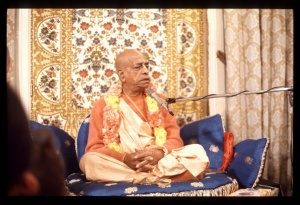CC Madhya 8.79 (1975): Difference between revisions
(Vanibot #0027: CCMirror - Mirror CC's 1996 edition to form a basis for 1975) |
(Vanibot #0020: VersionCompareLinker - added a link to the Version Compare feature) |
||
| Line 2: | Line 2: | ||
<div style="float:left">'''[[Sri Caitanya-caritamrta (1975)|Śrī Caitanya-caritāmṛta (1975)]] - [[CC Madhya (1975)|Madhya-līlā]] - [[CC Madhya 8 (1975)|Chapter 8: Talks Between Śrī Caitanya Mahāprabhu and Rāmānanda Rāya]]'''</div> | <div style="float:left">'''[[Sri Caitanya-caritamrta (1975)|Śrī Caitanya-caritāmṛta (1975)]] - [[CC Madhya (1975)|Madhya-līlā]] - [[CC Madhya 8 (1975)|Chapter 8: Talks Between Śrī Caitanya Mahāprabhu and Rāmānanda Rāya]]'''</div> | ||
<div style="float:right">[[File:Go-previous.png|link=CC Madhya 8.78 (1975)|Madhya-līlā 8.78]] '''[[CC Madhya 8.78 (1975)|Madhya-līlā 8.78]] - [[CC Madhya 8.80 (1975)|Madhya-līlā 8.80]]''' [[File:Go-next.png|link=CC Madhya 8.80 (1975)|Madhya-līlā 8.80]]</div> | <div style="float:right">[[File:Go-previous.png|link=CC Madhya 8.78 (1975)|Madhya-līlā 8.78]] '''[[CC Madhya 8.78 (1975)|Madhya-līlā 8.78]] - [[CC Madhya 8.80 (1975)|Madhya-līlā 8.80]]''' [[File:Go-next.png|link=CC Madhya 8.80 (1975)|Madhya-līlā 8.80]]</div> | ||
{{CompareVersions|CC|Madhya 8.79|CC 1975|CC 1996}} | |||
{{RandomImage}} | {{RandomImage}} | ||
==== TEXT 79 ==== | ==== TEXT 79 ==== | ||
<div class="verse"> | <div class="verse"> | ||
:prabhu kahe, | :prabhu kahe, "eho uttama, āge kaha āra" | ||
:rāya kahe, | :rāya kahe, "kāntā-prema sarva-sādhya-sāra" | ||
</div> | </div> | ||
| Line 25: | Line 24: | ||
<div class="translation"> | <div class="translation"> | ||
The Lord said, | The Lord said, "Your statements are certainly getting better and better one after the other, but surpassing all of them is another transcendental mellow, and you can speak of that as the most sublime." Rāmānanda Rāya then replied, "Conjugal attachment for Kṛṣṇa is the topmost position in love of Godhead. | ||
Rāmānanda Rāya then replied, | |||
</div> | </div> | ||
| Line 33: | Line 31: | ||
<div class="purport"> | <div class="purport"> | ||
In general, love of Godhead is devoid of the intimacy of ownership. In the case of love in servitude, there is a want of confidence. There is a want of increased affection in the fraternal relationship, | In general, love of Godhead is devoid of the intimacy of ownership. In the case of love in servitude, there is a want of confidence. There is a want of increased affection in the fraternal relationship, but when this affection increases in the paternal relationship, there is nonetheless a want of complete freedom. However, when one becomes a conjugal lover of Kṛṣṇa, everything lacking in the other relationships is completely manifest. Love of Godhead lacks nothing in the conjugal stage. The summary of this verse is that paternal love of Godhead is certainly higher than fraternal love and that conjugal love is higher yet. It was when Śrī Caitanya Mahāprabhu requested Rāmānanda Rāya to go further that he came to the point of the conjugal relationship, which is the highest perfectional stage of transcendental love. | ||
</div> | </div> | ||
Latest revision as of 20:25, 27 January 2020

A.C. Bhaktivedanta Swami Prabhupada
TEXT 79
- prabhu kahe, "eho uttama, āge kaha āra"
- rāya kahe, "kāntā-prema sarva-sādhya-sāra"
SYNONYMS
prabhu kahe—the Lord replied; eho uttama—this is very good; āge—ahead; kaha—speak; āra—more; rāya kahe—Rāmānanda Rāya replied; kāntā-prema—loving service between husband and wife; sarva-sādhya-sāra—the highest perfectional stage.
TRANSLATION
The Lord said, "Your statements are certainly getting better and better one after the other, but surpassing all of them is another transcendental mellow, and you can speak of that as the most sublime." Rāmānanda Rāya then replied, "Conjugal attachment for Kṛṣṇa is the topmost position in love of Godhead.
PURPORT
In general, love of Godhead is devoid of the intimacy of ownership. In the case of love in servitude, there is a want of confidence. There is a want of increased affection in the fraternal relationship, but when this affection increases in the paternal relationship, there is nonetheless a want of complete freedom. However, when one becomes a conjugal lover of Kṛṣṇa, everything lacking in the other relationships is completely manifest. Love of Godhead lacks nothing in the conjugal stage. The summary of this verse is that paternal love of Godhead is certainly higher than fraternal love and that conjugal love is higher yet. It was when Śrī Caitanya Mahāprabhu requested Rāmānanda Rāya to go further that he came to the point of the conjugal relationship, which is the highest perfectional stage of transcendental love.